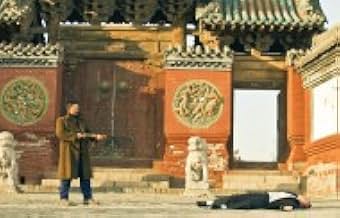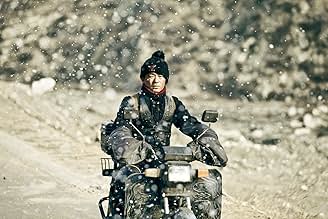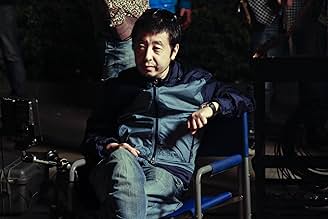CALIFICACIÓN DE IMDb
7.1/10
14 k
TU CALIFICACIÓN
Cuatro historias independientes ambientadas en China moderna sobre actos de violencia al azar.Cuatro historias independientes ambientadas en China moderna sobre actos de violencia al azar.Cuatro historias independientes ambientadas en China moderna sobre actos de violencia al azar.
- Premios
- 18 premios ganados y 12 nominaciones en total
Opiniones destacadas
Beautiful movie about living at the bottom of the economic class may lead to random violent acts of aggression - as your only way of releasing the anger inside - , it was close but didn't quite make it ..
Story could have been told more visually , with less but useful dialogue , as the cinematography and beauty within the scenes are amazing . But like most art-houses the story doesn't fully add up . -----------------------------------------------------
Part 1: A man living in a village getting drained by the coal mine industry reaches his ultimate limit - and takes out everyone involved in the corporate scandal 8/10
Part 2: A motorcyclist with an excitement to gun violence ; sibling in an aging family, he "robs" people as his way of making a living 5/10
Part 3: A woman is having an affair with a married man but calls it quits for fear it'll ruin her image . Being false accused for being a slut , she makes a drastic decision. 6.5/10
Part 4: A kid gets blamed for injuring a coworker and has to pay his debt through checks for the next 100 days . He calls quits instead and decides to fall in love with a sex worker during his free time . When his life reaches a dead end he decides to end it there . 7.5/10
Overall 7/10 6/10 Script 9/10 Level of Violence 11/10 Violence Shock Value (Realism of Violence) 100/10 Beauty of the Cinematography
Story could have been told more visually , with less but useful dialogue , as the cinematography and beauty within the scenes are amazing . But like most art-houses the story doesn't fully add up . -----------------------------------------------------
Part 1: A man living in a village getting drained by the coal mine industry reaches his ultimate limit - and takes out everyone involved in the corporate scandal 8/10
Part 2: A motorcyclist with an excitement to gun violence ; sibling in an aging family, he "robs" people as his way of making a living 5/10
Part 3: A woman is having an affair with a married man but calls it quits for fear it'll ruin her image . Being false accused for being a slut , she makes a drastic decision. 6.5/10
Part 4: A kid gets blamed for injuring a coworker and has to pay his debt through checks for the next 100 days . He calls quits instead and decides to fall in love with a sex worker during his free time . When his life reaches a dead end he decides to end it there . 7.5/10
Overall 7/10 6/10 Script 9/10 Level of Violence 11/10 Violence Shock Value (Realism of Violence) 100/10 Beauty of the Cinematography
As always with portmanteau films, I found the quality of these four tales (or tellings) varies quite a lot, as does one's sympathy or empathy for the characters. As such, as others have commented, I thought that the rest of the film did not match up to the first quarter. However, the other three parts were not *bad*, and for me added to the overall tone of societal bleakness. I've made brief visits to China but would in no way say that qualifies me to judge how "realistic" a picture this is, despite the factual bases of the component stories. However, as we increasingly observe and debate the effect of China's actions on the wider global stage, this film perhaps provides helpful context, if this is the domestic backdrop...
After some moments of silence, the master of the sixth generation of Chinese filmmakers, Jia Zhangke returns with his newest feature "A Touch of Sin" (2013) which might just be his darkest work to date. It's an intriguing film of sheer brilliance told through the complexity of several, loosely connected stories about people in agony. While some fans of the director may be disappointed by the lack of clairvoyant lyric beauty, characteristic for example for "Still Life" (2006), others may find the narrative ambiguity and incoherence rather enriching.
The film begins with an enigmatic scene at a deserted rural highway where a truck carrying tomatoes has fallen over. A cold sense of brutality breathes in the air. Soon the first characters are introduced and we learn that, in the same way as in "Still Life", "A Touch of Sin" is structured from different stories with different human fates. In brief, it tells the story of four random acts of violence in today's society.
Although the stories lack obvious connection, they all share a few essential elements. First of all, they all escalate to an outburst of violence. Second, all of them are tales of social rootlessness and existential alienation. The latter remark is congruous with the fact that in all of Zhangke's films the general aspect meets the particular in a poignant fashion of chill and solitude. Individuals live in their personal prisons while the modernization of the society brings nothing but empty freedom. In other words, they live in spaces that are both private and public where they feel utterly detached. No one belongs anywhere in the Zhangke universe.
Due to the complexity of several stories, the film also includes more than one central milieu. However, this seemingly arbitrary set of different settings of hotels and a coal miners' town do tell us about veritably similar subjects. All the spaces are haunted by the same problems. Such conflict of ambiguity and coherence should not frighten the spectator. Since instead of a straight-forward narrative with clear character delineation, Zhangke offers us a fascinatingly cynical cross-section of the contemporary Chinese society which is, on the one hand, characterized by economic boom to whose technological wonderland an individual may vanish, and, on the other, the tormenting but also comforting legacy of Mao.
Modern Chinese way of life appears to Zhangke as something diverse -- as something that is in a constant state of change. Like in his previous features, Zhangke once again focuses on the transforming reality, the current flow, and its consequences on the individuals. Although this was already done to an extent in "Still Life" through the complexity of two overlapping stories, it also cast hope in humanity, whereas "A Touch of Sin" is far more pessimistic.
Once again Zhangke's aesthetics of cinema is characterized by the elements of silence and emptiness in the images of loneliness and alienation. It is as though everything had died. Only violence is portrayed passionately, all the rest is understated. The violence in "A Touch of Sin" is raw and brutal, but essentially stripped. Above all, violence appears as a melancholic undertone of some kind which reveals the realities of the society.
Even if the opaque and complex narrative of "A Touch of Sin" left the viewer speechless and unable to describe what he or she had just seen, there is always something profound to admire in Zhangke's cinema. In his films there is always that certain mood which is quite difficult to be put in words. In brief, it is a mood of emptiness, but also of utter richness.
The film begins with an enigmatic scene at a deserted rural highway where a truck carrying tomatoes has fallen over. A cold sense of brutality breathes in the air. Soon the first characters are introduced and we learn that, in the same way as in "Still Life", "A Touch of Sin" is structured from different stories with different human fates. In brief, it tells the story of four random acts of violence in today's society.
Although the stories lack obvious connection, they all share a few essential elements. First of all, they all escalate to an outburst of violence. Second, all of them are tales of social rootlessness and existential alienation. The latter remark is congruous with the fact that in all of Zhangke's films the general aspect meets the particular in a poignant fashion of chill and solitude. Individuals live in their personal prisons while the modernization of the society brings nothing but empty freedom. In other words, they live in spaces that are both private and public where they feel utterly detached. No one belongs anywhere in the Zhangke universe.
Due to the complexity of several stories, the film also includes more than one central milieu. However, this seemingly arbitrary set of different settings of hotels and a coal miners' town do tell us about veritably similar subjects. All the spaces are haunted by the same problems. Such conflict of ambiguity and coherence should not frighten the spectator. Since instead of a straight-forward narrative with clear character delineation, Zhangke offers us a fascinatingly cynical cross-section of the contemporary Chinese society which is, on the one hand, characterized by economic boom to whose technological wonderland an individual may vanish, and, on the other, the tormenting but also comforting legacy of Mao.
Modern Chinese way of life appears to Zhangke as something diverse -- as something that is in a constant state of change. Like in his previous features, Zhangke once again focuses on the transforming reality, the current flow, and its consequences on the individuals. Although this was already done to an extent in "Still Life" through the complexity of two overlapping stories, it also cast hope in humanity, whereas "A Touch of Sin" is far more pessimistic.
Once again Zhangke's aesthetics of cinema is characterized by the elements of silence and emptiness in the images of loneliness and alienation. It is as though everything had died. Only violence is portrayed passionately, all the rest is understated. The violence in "A Touch of Sin" is raw and brutal, but essentially stripped. Above all, violence appears as a melancholic undertone of some kind which reveals the realities of the society.
Even if the opaque and complex narrative of "A Touch of Sin" left the viewer speechless and unable to describe what he or she had just seen, there is always something profound to admire in Zhangke's cinema. In his films there is always that certain mood which is quite difficult to be put in words. In brief, it is a mood of emptiness, but also of utter richness.
after finally watching A Touch Of Sin this evening at ACMI with some friends, it's left me stuck in 2 worlds - missing Jia Zhang-Ke's meditative & lyrical work of the past & liking the new approach to these social wrongs in a more brutal / violent / cynical manner...
first thoughts were quite similar to when i watched another master film maker Kim Ki-Duk's "Pieta" which after further digestion, thought & reading became my fave film of 2013 - both films show violence in a heavy way but still portray it in a meditative & profound manner, using symbolic moments to remind the audience about these issues...
in hindsight i really like this film and where Jia is going with his approach... considering this is a narrative driven film over his powerful and thought provoking documentaries, all the killings were based on real events the director read in blogs... the film is a vessel to show these separate events as one about alienation, the varying classes in china & corruption / political flaws...
here's a good article from Slant which covers a lot of how i feel towards the films - 8/10
http://www.slantmagazine.com/film/review/a-touch-of-sin
first thoughts were quite similar to when i watched another master film maker Kim Ki-Duk's "Pieta" which after further digestion, thought & reading became my fave film of 2013 - both films show violence in a heavy way but still portray it in a meditative & profound manner, using symbolic moments to remind the audience about these issues...
in hindsight i really like this film and where Jia is going with his approach... considering this is a narrative driven film over his powerful and thought provoking documentaries, all the killings were based on real events the director read in blogs... the film is a vessel to show these separate events as one about alienation, the varying classes in china & corruption / political flaws...
here's a good article from Slant which covers a lot of how i feel towards the films - 8/10
http://www.slantmagazine.com/film/review/a-touch-of-sin
This film exposes the difficulties of a few characters in various Chinese provinces - people of average circumstances just trying to get by. Their stories are based on true events.
This film is suitably shocking in many ways in exposing not only the difficulties of the characters in focus but also the extreme reactions some of them have in dealing with their circumstances. The most creepy aspect is the absence of any authorities or help given to those who need it. This was intended by director Jia Zhang-Ke to expose modern life in China.
While there are powerful scenes in this movie, it seemed confusing at times and not fully coherent and a bit long at over two hours. But credit can be given to the boldness of exposing so much in a totalitarian regime. - dbamateurcritic
This film is suitably shocking in many ways in exposing not only the difficulties of the characters in focus but also the extreme reactions some of them have in dealing with their circumstances. The most creepy aspect is the absence of any authorities or help given to those who need it. This was intended by director Jia Zhang-Ke to expose modern life in China.
While there are powerful scenes in this movie, it seemed confusing at times and not fully coherent and a bit long at over two hours. But credit can be given to the boldness of exposing so much in a totalitarian regime. - dbamateurcritic
¿Sabías que…?
- TriviaJia Zhang-ke: in the third story as a patron of the brothel. He is shown walking down a hallway from behind talking on his cell phone and smoking a cigar. At the end of the shot he turns to survey the line of girls in the hallway.
- ConexionesFeatured in At the Movies: Episode #10.23 (2013)
Selecciones populares
Inicia sesión para calificar y agrega a la lista de videos para obtener recomendaciones personalizadas
- How long is A Touch of Sin?Con tecnología de Alexa
Detalles
- Fecha de lanzamiento
- Países de origen
- Sitio oficial
- Idiomas
- También se conoce como
- A Touch of Sin
- Locaciones de filmación
- Chongqing, China(San'er episode)
- Productoras
- Ver más créditos de la compañía en IMDbPro
Taquilla
- Total en EE. UU. y Canadá
- USD 154,120
- Fin de semana de estreno en EE. UU. y Canadá
- USD 19,867
- 6 oct 2013
- Total a nivel mundial
- USD 854,891
- Tiempo de ejecución2 horas 10 minutos
- Color
- Mezcla de sonido
- Relación de aspecto
- 2.35 : 1
Contribuir a esta página
Sugiere una edición o agrega el contenido que falta















